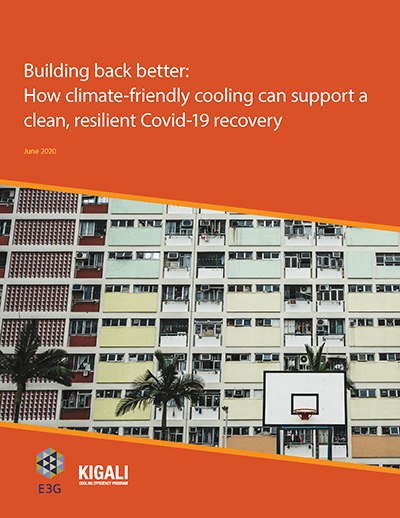Building back better: How climate-friendly cooling can support a clean, resilient Covid-19 recovery
Building back better: How climate-friendly cooling can support a clean, resilient Covid-19 recovery
 Covid-19 and the measures being taken to mitigate the subsequent public health and economic crises are creating huge global shocks. In response, governments and financial institutions are quickly developing fiscal and monetary packages that are unprecedented in scale. The World Bank, International Monetary Fund, International Energy Agency, European Commission, and others across industry, academia, and civil society are challenging governments to keep sight of the climate crisis and to use Covid-19 stimulus packages and recovery plans as an opportunity to build back better, for a cleaner, more resilient world.
Covid-19 and the measures being taken to mitigate the subsequent public health and economic crises are creating huge global shocks. In response, governments and financial institutions are quickly developing fiscal and monetary packages that are unprecedented in scale. The World Bank, International Monetary Fund, International Energy Agency, European Commission, and others across industry, academia, and civil society are challenging governments to keep sight of the climate crisis and to use Covid-19 stimulus packages and recovery plans as an opportunity to build back better, for a cleaner, more resilient world.
Cooling plays a central role in supporting societies through this crisis; from protecting temperature-sensitive medical supplies and patients in crowded hospitals, to ensuring reliable food supplies while food systems are disrupted. Efficient, climate-friendly cooling could also help many struggling businesses get back on the road to profitability through significant energy cost savings. All of this, in turn, will help governments meet near-term stimulus objectives while also meeting the commitments that were made as a part of the Paris Agreement, Kigali Amendment to the Montreal Protocol, and Sustainable Development Goals (SDGs), which are all crucial for a better recovery.
The Kigali Cooling Efficiency Program (K-CEP), a philanthropic collaboration active in over 50 countries, has identified six high-impact opportunities that can reduce emissions, increase job creation, and enhance economic output through the inclusion of efficient, climate-friendly cooling in stimulus packages.